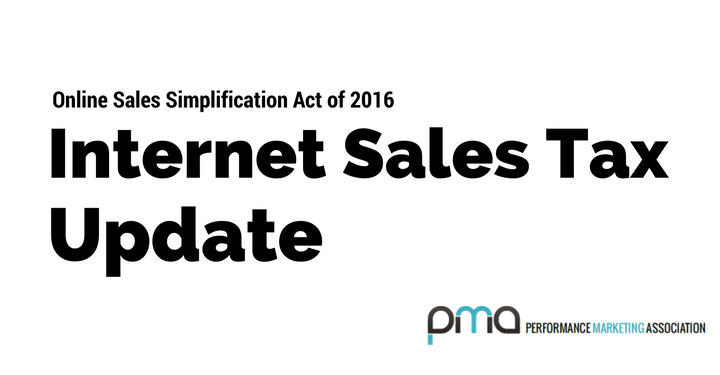The Latest Proposed Internet Sales Tax Bill

This month, Congressman Goodlatte of VA has circulated a discussion draft of a new bill called the “Online Sales Simplification Act of 2016”.
Articles from two major publishers have been released recently addressing the topic:
In a Nutshell
If this bill were to pass, online merchants would collect sales tax from each buyer based on the buyer’s home state. You’d remit the tax to your state who would pass it through to a Clearinghouse that would then distribute funds back to states.
So, if your company is in IL and you sell something to someone in MI, you would collect 6% (Michigan’s sales tax) on the purchase. You’d remit the amount to the State of Illinios who would then send the tax to the Clearinghouse. The Clearinghouse would credit it to the State of Michigan.
But… It’s Not That Simple
Despite the term “Simplification” appearing in the bill’s name, it’s not all that simple.
State sovereignty is clearly an issue the bill’s sponsor is sensitive to. If the bill passes, each state will have a choice whether or not to participate. So, there are contingencies around participation. Furthermore, there are states that currently don’t impose a sales tax, so those contingencies spread to cover situations in which a buyer or a seller reside in a sales tax free state.
Participating states would be required to create programs and processes to certify merchants and manage monetary and data receipts from them. Merchants, whether they are in a participating state or not, would have certifications to gain as well as tax and data collection (and protection) processes to put in place.
Is This Another Nexus Bill?
No – not in the way that we’ve come to know nexus bills. “Nexus” refers to creating a connection. With Nexus tax bills, states attempt to create a connection between themselves and merchants so that they can collect sales tax from those merchants. Obviously, incorporating in a state or setting up HQ in a state are merchant acts that states can easily use as proof that a connection (nexus) exists.
The nexus bills that have rocked our industry in recent years have attempted to point to affiliates as proof of nexus. Several states have insisted that having an affiliate in their state creates enough of a connection between their state and the merchant that the merchant will need to pay the state sales tax.
This bill doesn’t attempt to make a connection using affiliates. In fact, this bill excludes affiliates from the discussion. “…does not include entering into an agreement under which a person, for a commission or other consideration, directly or indirectly refers potential purchasers to a seller outside the State, whether by an Internet-based link or platform, Internet Web site otherwise…”
Here’s How Merchants Might Be Affected
The merchant’s connection to a state is defined in part as “physical presence” – this is used to differentiate between in state and “remote” sales. Having property, employees, and other operations setup to garner business from buyers in the state all work towards “physical presence”.
The other factor for a merchant’s connection to a state is defined as the “origin locality”. This means “… the location in the origin State in which the remove seller has employed the greatest average number of employees on business days during the preceding calendar year.”
If this bill passes, and your state (origin locality) chooses to participate, you will need to collect sales tax on the remote purchases (physical presence) made on your site. Tax will be calculated at the rate set by the Destination State (the buyer’s state).
If the buyer’s state does not choose to participate, you would collect tax based on your origin
locality. In cases where tax is collected from or for a state that’s not participating, you would also be required to collect and report each buyer’s name, address and sale amount.
Here’s How Affiliates Might Be Affected
As mentioned above, this bill appears to specifically exclude affiliates from the equation. This could mean that current bills that use affiliates as a nexus will be moot at least, and possibly repealed if states choose to participate in the Clearinghouse instead.
Potential Upside for Performance Marketing
The PMA has long supported and lobbied for the Marketplace Fairness Act of 2013 which has a number of similarities with positive portions of this bill including:
- It’s a Federal solution, streamlining the rules and processes, negating the need to keep up with 50 independent rules;
- Rates are based on the destination, ie the buyer’s home state;
- A clearly defined “seller” that excludes affiliates
Potential Downside for Performance Marketing
Because of its sensitivity to state sovereignty, this bill could end up being one of many pieces of legislation that we’ll need to follow. This leaves us in much the same situation as we are now, staying on top of regulations in each state, and a federal solution.
If it does pass, compliance with the bill will be no easy feat for states or for merchants.
Updates and Involvement
Stay tuned to the PMA for updates on this bill and others related to internet sales tax.
Get involved by joining our special council dedicated to Nexus and other tax issues facing our industry. Contact us at yourboard@thepma.org for more information about the special council.
Latest posts by Members (see all)
- Is Influencer Marketing a Performance Marketing Strategy? - August 25, 2017
- 2017 Salary Survey is Now Open - July 20, 2017
- No Regulation Without Representation - September 28, 2016

 Follow
Follow